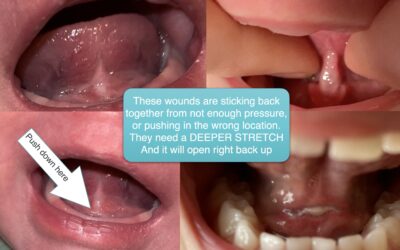Welcome! This blog post was mentioned in a recent New York Times article. Please take a moment to read our response to the article from a different vantage point.
Many people are surprised when they hear of the link between tongue- and lip-ties and GI symptoms like constipation and reflux. The truth is, it shouldn’t be all that surprising when you consider that the mouth is the beginning of the GI tract. Most physicians don’t realize that oral restrictions can have an effect on what happens later on in digestion but let’s just say, “if the food doesn’t start the journey right, it won’t end the journey right either.” Digestion starts in the mouth.
Reflux and constipation are two common GI problems that affect millions of people a year, and infants to adults are commonly given a pill, a suppository, or some other remedy to solve the issue. Almost never does anyone connect that a problem in the mouth could, in many cases, be associated with or at least worsen the symptoms they are experiencing.
Let’s start with reflux. In infants, there is good data to support that infant gastroesophageal reflux (GER) is, in many cases, related to swallowing air, called aerophagia (literally “eating air”). It was termed AIR, or Aerophagia Induced Reflux, by my colleague Dr. Scott Siegel in 2016. Dr. Bobby Ghaheri also studied infant reflux and tongue-tie in 2017, 2018, and 2022. His prospective cohort study with nursing babies and randomized controlled trial with bottle-feeding babies showed a significant reduction in infant reflux after a proper tongue-tie release.
If a baby can get a better latch on the breast or bottle and a better seal as well (less clicking noises, less milk spilling out, and in turn, less air swallowing), this helps greatly with reflux symptoms. It also helps with gassiness, fussiness, and colic symptoms, as well as constipation and normal stools. We observe these changes multiple times a day as one of the most consistent findings after a proper tongue and lip tie release in our office. If the baby gets a deeper latch from the tongue release AND the lip can flip out well for a proper seal from the lip-tie release (in many cases, babies have both ties), then we see the changes. If a tongue is clipped partially, or if a restrictive lip tie is not treated, you may or may not see the full improvements that are possible.
One of our twins only had her tongue released, and we left the “mild” lip-tie thinking it wouldn’t be a problem. She had horrible reflux that required medication, she couldn’t latch as well as her sister, who had both lip and tongue released, and when she turned one, she had a big gap in her teeth anyway, so I ended up releasing it at a year old (and the gap, of course, closed right up).
This is just one example, but we see it repeated in the office often enough that the principle seems to hold true. All that to say, if your baby had his or her tongue only treated (make sure it was a full release with a flat diamond appearance to the wound) and the lip was not treated, and you still have GI symptoms, it might be due to a restricted lip. If that lip cannot flip or flange normally without discomfort, then it can lead to air swallowing and GI symptoms, so get it evaluated and treated properly. Additionally, babies who have had tongue and lip-ties treated often require bodywork before and after (physical therapist, chiropractor, osteopath, CST, etc.), and sometimes the tension in their bodies can lead them to spit up more, so make sure to get that checked as well.
After we treat kids and adults for tongue-tie, they also see reflux improvements, but it’s sometimes a little less obvious or consistent, so as they get older, the cause is likely more multifactorial. Eliminating gluten and dairy can help too. But when a tongue-tie release improves sleep quality, it can also reduce nighttime reflux that comes from the negative pressure of trying to breathe against a tongue that fell back into the throat.
Constipation is interesting because it’s at the other end of the GI tract, but there are at least three reasons why we see it affected by a tongue-tie release as well. I didn’t believe this at first, but after dozens of patients kept reporting their child had less constipation afterward, I started to listen and come up with hypotheses about why this is so. If the food is not chewed properly because the tongue cannot lateralize a bolus, it can pass to the stomach and intestines in chunks and only be partially digested, often leading to constipation.
Also, the swallow is the beginning of the peristaltic wave that travels down the GI tract. If the swallow is limited or not as powerful because the tongue has decreased mobility, the wave is diminished, and GI motility seems to be impacted. The last reason is likely due to parasympathetic activation after the tongue-tie release. When you release the fascia under the tongue, a wave of relaxation and stimulation of the vagus nerve occurs. This puts the body more into “rest and digest” rather than “fight or flight,” and babies to adults feel more relaxed, less stressed, and can digest better – and poop better too, it seems. So those are the best explanations I can give for why this helps. Do I have a randomized controlled study to back this up? No. But do we observe it daily. It’s quite a common finding that is impossible to deny.
If you’re looking for answers to your child’s reflux or constipation and are hitting a dead end, or have tried all the traditional answers, check under the tongue or have a proper evaluation by a provider who routinely treats tongue-ties. Send us a message or give us a call at 205-419-4333. We’d love to help your family.
If you’re a provider looking to learn more, check out our online course, Tongue-Tied Academy, our Advanced Live Patient Course at our office, or simply read our bestselling book, Tongue-Tied. Thanks for joining us with an open mind on this tongue-tie journey!



